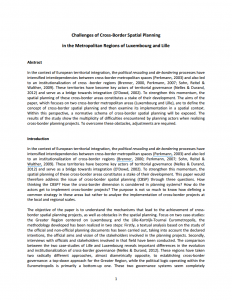European perspective
literature

Information
Author
Frédéric Durand
Year of publication
2014
Language
English (EN)
Download
Share
Challenges of Cross-Border Spatial Planning in the Metropolitan Regions of Luxembourg and Lille
Abstract
In the context of European territorial integration, the political rescaling and de-bordering processes have intensified interdependencies between cross-border metropolitan spaces (Perkmann, 2003) and also led to an institutionalization of cross -border regions (Brenner, 2000, Perkmann, 2007; Sohn, Reitel & Walther, 2009). These territories have become key actors of territorial governance (Nelles & Durand, 2012) and serve as a bridge towards integration (O’Dowd, 2002). To strengthen this momentum, the spatial planning of these cross-border areas constitutes a stake of their development.
The aims of the paper, which focuses on two cross-border metropolitan areas (Luxembourg and Lille), are to define the concept of cross-border spatial planning and then examine its implementation in a spatial context. Within this perspective, a normative schema of cross-border spatial planning will be exposed. The results of the study show the multiplicity of difficulties encountered by planning actors when realizing cross-border planning projects. To overcome these obstacles, adjustments are required.